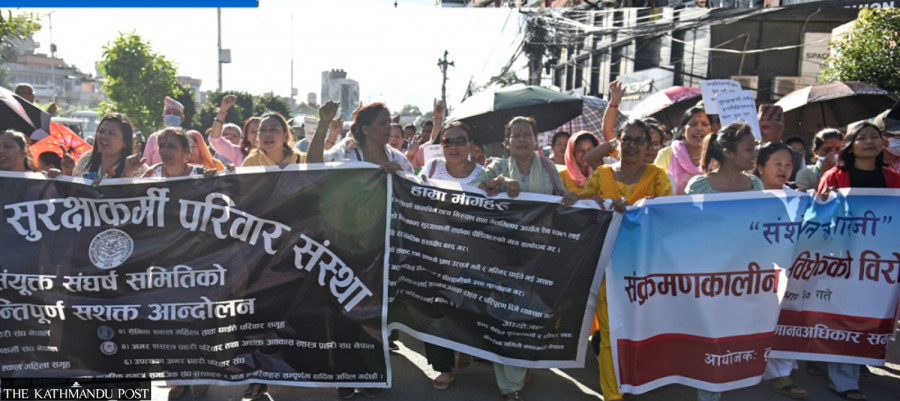National
Parties agree to revise proposed changes to Transitional Justice Act
Some provisions in the amendment bill have met with widespread criticism over fears that they may be used to grant amnesty to perpetrators.
Binod Ghimire
The five-party ruling coalition has agreed to revise the amendment bill to Enforced Disappearances Enquiry, Truth and Reconciliation Commission Act 2014 before its parliamentary endorsement.
Following widespread criticism, the ruling parties on Tuesday decided to revise it by registering amendments to the bill once the parliamentary process begins.
The bill that was registered on July 15 in the Parliament is yet to be presented for discussions.
Lawmakers can register amendments once the house completes preliminary discussions.
“There has been an agreement for the revision as the parties are committed to taking the transitional justice process to a logical end,” Minister for Law and Justice Govinda Sharma Bandi told the Post. “The bill will, most probably, be presented in the upcoming meeting of the House of Representatives.”
The next House meeting has been slated for Thursday.
A month passed since the bill was registered in the Parliament, it is yet to be presented following criticism from the conflict victims, human rights activists and national and international human rights organizations. Bandi said as the bill is a document of political compromise, all the concerns of the conflict victims couldn’t be accommodated.
“The issues of amendment will be finalised based on the political consensus,” said Bandi. “Maximum efforts will be made to address all the grievances.”
He said it is likely that the list of the serious human rights violations will be revised, the provision to appeal the decision of the Special Tribunal, to be formed to decide on the cases from the insurgency, will be added while it will be ensured that the statute of limitations will be waived for such cases.
The law minister had consulted the conflict victim organisations, human rights activists and National Human Rights Commission before briefing the top leaders from the ruling parties.
Bhagiram Chaudhari, a former chairperson of the Conflict Victims Common Platform, said that Bandi was positive about their concerns about the revision.
“Let’s see how the bill is revised,” he said.
The bill says “cruel murder” or murder after torture, rape, enforced disappearances and inhumane or cruel torture committed against unarmed or ordinary people during the insurgency are serious human rights violations and non-amnestiable. It, however, doesn’t list war crimes and crimes against humanity under serious human rights violations. The bill also doesn’t have any provision to address the concerns of former minor combatants.
The bill has opened the door for amnesty for murder by saying only “cruel murder” will be non-amnestiable, thus providing a loophole to define all murders as non-cruel and grant amnesty for all murders.
They also have said the provision that the verdict of the Special Court cannot be appealed at the Supreme Court is against international fair trial guarantees. They also object to the provision that the insurgency-era cases of human rights violation that are sub judice in the district courts and high courts will be sent to the two commissions to ascertain if they indeed are cases of serious violations of human rights.




 20.53°C Kathmandu
20.53°C Kathmandu















